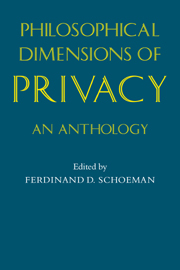Book contents
- Frontmatter
- Contents
- List of contributors
- Preface
- 1 Privacy: philosophical dimensions of the literature
- 2 Social distance and the veil
- 3 The origins of modern claims to privacy
- 4 The right to privacy [the implicit made explicit]
- 5 Privacy [a legal analysis]
- 6 Privacy as an aspect of human dignity: an answer to Dean Prosser
- 7 Privacy [a moral analysis]
- 8 Privacy, freedom, and respect for persons
- 9 Privacy and self-incrimination
- 10 Intimacy and privacy
- 11 The right to privacy
- 12 Why privacy is important
- 13 Privacy, intimacy, and personhood
- 14 Privacy: some arguments and assumptions
- 15 An economic theory of privacy
- 16 Privacy and the limits of law
- 17 Privacy and intimate information
- Selected bibliography
- Index of names
9 - Privacy and self-incrimination
Published online by Cambridge University Press: 12 December 2009
- Frontmatter
- Contents
- List of contributors
- Preface
- 1 Privacy: philosophical dimensions of the literature
- 2 Social distance and the veil
- 3 The origins of modern claims to privacy
- 4 The right to privacy [the implicit made explicit]
- 5 Privacy [a legal analysis]
- 6 Privacy as an aspect of human dignity: an answer to Dean Prosser
- 7 Privacy [a moral analysis]
- 8 Privacy, freedom, and respect for persons
- 9 Privacy and self-incrimination
- 10 Intimacy and privacy
- 11 The right to privacy
- 12 Why privacy is important
- 13 Privacy, intimacy, and personhood
- 14 Privacy: some arguments and assumptions
- 15 An economic theory of privacy
- 16 Privacy and the limits of law
- 17 Privacy and intimate information
- Selected bibliography
- Index of names
Summary
Introduction
The privilege against self-incrimination embodied in the Fifth Amendment is under attack again. This in itself is not surprising. All of the rights set out in the Bill of Rights are limitations on the will of the majority, and they are bound to be resented if they are effective. But the attack on this privilege is of a rather different character from those made on the other rights and privileges. It is more persistent, emanates from more respectable sources, and calls forth a rather more equivocal and ineffectual defense.
Much of the reason for this seems to lie in history. The privilege is, to a great extent, a victim of its own early popularity. It became a rallying point in seventeenth-century England, and, to a degree, in seventeenth- and eighteenth-century America, in large part for reasons which had little to do with its intrinsic merit or lack of it. It was seized upon because it just happened to be a handy means to shield some very popular people against some very unpopular laws. Anything, no matter how badly supported by reasoning, might have served as well. Thus, it became established as part of our legal tradition without ever having been subjected to a thorough examination. Levy seems wholly justified in saying that “by 1776 the principle … was simply taken for granted and so deeply accepted that its constitutional expression had the mechanical quality of a ritualistic gesture in favor of a self-evident truth needing no explanation.”
- Type
- Chapter
- Information
- Philosophical Dimensions of PrivacyAn Anthology, pp. 245 - 264Publisher: Cambridge University PressPrint publication year: 1984
- 3
- Cited by



